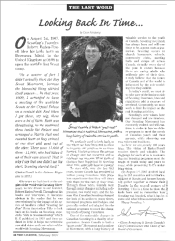What is the Scouting Movement?
A response to Chief Commissioner Glenn Armstrong
Our Chief Commissioner, in The Leader magazine (February 2007) asserts that there are two aspects to the Scouting movement, the grass roots movement and the National Movement. There is no such thing as a national movement. Such assertions are mere propaganda foisted upon us to justify the corporatization of the Movement. While the movement certainly has a national character, the organizational structures in place to serve the movement are not, in and of themselves, a National Movement - they are a National Organization. It is a fallacy to call the Scouts Canada national organization a National Movement.
The Chief Commissioner is twisting the language when he writes about a "grass roots organization." There certainly is organization at the grass roots, it is called the section and the group committee that looks after the administration of the sections. The abuse of language and the mis-description of the basic elements of the structures serves only to confuse the issues. The organization at any level exists for one purpose only, to serve those who constitute the Movement. One does not have to be a registered member to be part of the Scout Movement. Anyone who supports or subscribes to the principles of Scouting is a member of the movement. Our National Organization's disregard of this fundamental fact is seriously hampering the Scout movement in Canada because it ignores the good will of persons and organizations who, although not registered members, none the less subscribe to the principles and support the ideals of Scouting.
Baden-Powell said "First I had an idea. Then I saw an ideal. Now we have a Movement, and if some of you don't watch out we shall end up with just an organization" (emphasis added).
This statement has often been misinterpreted to mean that Scouting is not an organization, or that an organization is not important. Lord Baden-Powell's criticism was, however, not directed against the basic idea of an organization, but against Scouting becoming "just an organization." The World Organization of the Scout Movement in its document "The Fundamental Characteristics of Scouting" states that a "movement" implies not only a dynamic process aimed at achieving an objective, but also some type of organization and structure to ensure the objective is achieved. Organization and structure are only a means to achieve the movement's purpose. What is important to bear in mind is that, within a movement, organization and structure are a necessity but, that such organization and structure as are necessary, are definitely not to be an end in themselves. B-P wanted us to avoid organization or structure that exists only for itself and that, in consequence, fails to serve the movement and its purpose.
WOSM emphasizes that "Organizations that are self-serving and self-perpetuating go against the very concept of a movement." Within Scouting, as in any other movement, the organization and structures must always be aimed at reaching and designed to attain the movement's objectives. Their existence cannot otherwise be justified. Baden-Powell, in his Aids to Scoutmastership noted "Fortunately, in our Movement, by decentralization and giving a free hand to the local authorities, we avoid much of the red tape which has been the cause of irritation and complaint in so many other organizations."
Unfortunately, Scouts Canada ignores the sage observations of both B-P and WOSM. Scouting in Canada has suffered from a failure to move in the same direction as our societal values by failing to move toward a democratic structure as mandated by WOSM principles. Scouts Canada has in fact mandated a system of top down appointees. Not only is this contrary to our fundamental values but it is a formula for cronyism. With democratic procedures the voice of the movement's grass roots members will be heard and accountability will be a two way street. By being democratically chosen by the members, Leadership will gain the moral authority to give direction. Concurrently the membership will feel bound to follow the leadership because they have had the opportunity to express confidence in that leadership.
In the past four years over 15,000 leaders have voted with their feet. The reason for widespread discontent among the membership of Scouts Canada is not hard to understand. The Ordinary-member has been disenfranchised, has no vote and has no voice. We will only regain a vibrant, growing and effective Scouts Canada when our management, both volunteer and employed, becomes accountable to the membership through democratic structures. Our Board of Governors and our Chief Commissioner must begin this process by rejecting Orwellian language tricks that create the false notion that the national organization is a Movement.

